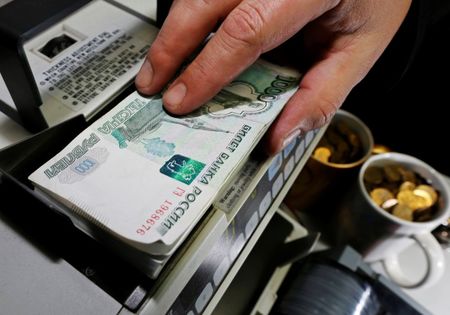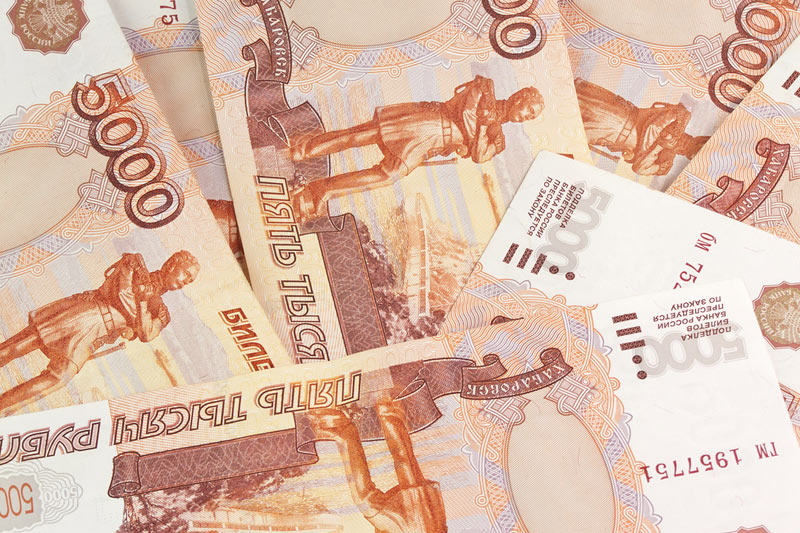By Alexander Winning and Vladimir Abramov
MOSCOW (Reuters) - The rouble recovered on Friday, paring heavy losses as investors anticipated possible action by the central bank to halt a slide that could destabilise Russia's financial system.
With the rouble appearing to be in free-fall in morning trade, some analysts said the country was already in the grip of a currency crisis.
It fell over 3 percent against both the dollar and the euro following similar falls on Thursday, but talk of an emergency central bank meeting saw it recoup its losses in the afternoon.
The central bank said late on Friday it was willing to increase its forex interventions to defend the rouble "at any moment" and to deploy other instruments in its policy arsenal to support the currency.
The bank said that while several fundamental factors had driven the rouble lower in recent months, it didn't regard a further fall in the rouble as necessary to achieve balance of payments equilibrium.
Prior to the central bank statement, traders said speculators who had opened long dollar positions were closing them in case the central bank took extraordinary measures to support the currency. Rising prices for Brent crude oil
By 1435 GMT, the rouble was 0.5 percent stronger than the previous close at 46.60 against the dollar
The rouble barely reacted to the central bank statement, weakening slightly in the minutes after it was published.
"People are closing long positions, fearing the central bank could do something over the weekend," said Dmitry Deev, a currency trader at Credit Suisse in Moscow.
"The danger of additional central bank interventions hangs over the market. The market fears some kind of non-traditional measures, especially given the fact that people have already started besieging currency exchange booths."
RETYING THE PURSE STRINGS?
On Wednesday, the central bank altered its interventions policy to limit its support for the rouble by cutting the size of its interventions to $350 million a day. The bank reserved the option of carrying out ad hoc currency interventions in order to preserve financial stability, however.
Several analysts said on Friday that this rubicon has now been crossed, requiring immediate central bank action in the form of heavy market interventions to defend the rouble.
"This is full-blown panic, with signs of a self-fulfilling currency crisis," Dmitry Polevoy, chief Russia economist at ING Bank in Moscow, said in a note. "At such times, the central bank should intervene, after all if this isn't a risk to financial stability, then what is?"
Citi economist Ivan Tchakarov said in a note that "the rouble slide in the last couple of days is starting to turn into a clear and present risk to macroeconomic and financial stability in the country".
The central bank "can ill afford a situation where the rouble weakness turns into a possible rout," he added, calling for the bank to "massively and unpredictably intervene in the FX market".
Others said the central bank may be forced to raise interest rates again, despite having hiked the key lending rate by 1.5 percentage points to 9.5 percent as recently as last Friday.
"Past form suggests that rates may need to rise to as much as 11.50-12.00 percent," said Neil Shearing, chief emerging markets economist at Capital Economics, said in a note.
Plunging oil prices and Western sanctions over the Ukraine crisis have shrivelled Russia's exports and investment inflows, driving the rouble almost 30 percent lower versus the dollar since the start of the year.
The rouble has taken a particularly heavy hit since the beginning of October, with the central bank spending around $30 billion to prop up the ailing currency, its largest monthly interventions in over five years.
SELF-FULFILLING PROCESS
Analysts said the slide in recent days cannot be explained by economic fundamentals alone, arguing that it is now being driven by ordinary Russians exchanging rouble savings into dollars.
"We think the rouble's 30 percent depreciation year-to-date clearly poses certain risks for financial stability, as not many will have assumed such a dramatic price action when doing their business planning," said Maxim Korovin, a forex analyst at VTB Capital in Moscow.
"Although some increase in geopolitical risks yesterday added to FX volatility, the key pressure on the rouble is most likely now primarily from households, which is a self-fulfilling process," he said.
Russian shares also weakened on Friday, with the dollar-denominated RTS index (IRTS) briefly touching a five-year low below 1,000 points in early trade before paring its losses.

(Reporting by Alexander Winning, Vladimir Abramov, Jason Bush and Elena Fabrichnaya; editing by John Stonestreet)
